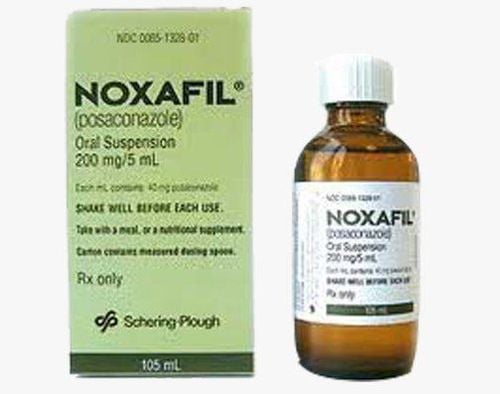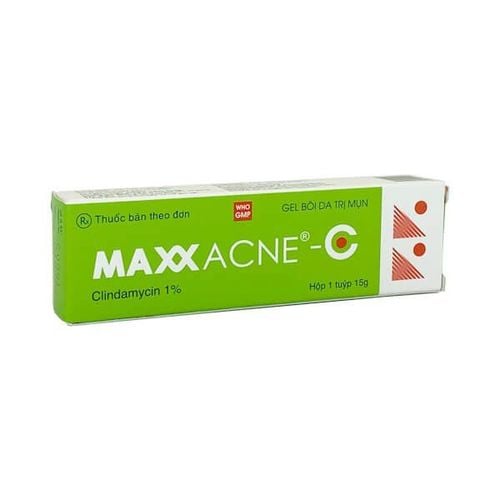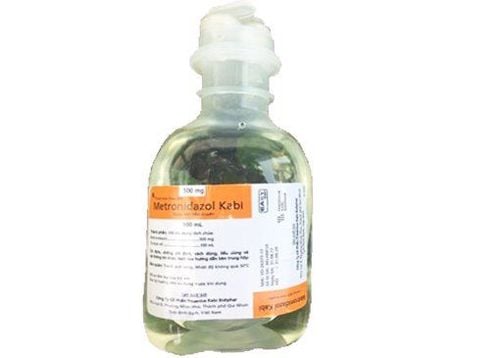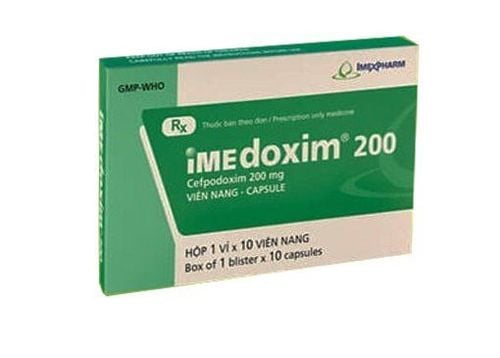This is an automatically translated article.
Tyrothricin is commonly used to treat bacterial, parasitic, fungal, or viral infections. Depending on the patient's age and infection status, the doctor will prescribe the appropriate form of Tyrothricin.1. What is Tyrothricin?
Tyrothricin is a drug belonging to the group of antifungal, anti-infective, antiviral and anti-parasitic drugs. The drug is often used for topical treatment of bacterial infections of the oral mucosa as prescribed by a specialist. Currently, the drug Tyrothricin is prepared in the following forms:Tyrothricin lozenges 0.5mg, 1mg, 4mg. Tyrothricin for topical application 5mg / 5g. Tyrothricin as a throat spray solution 4mg strength. Tyrothricin in the form of lozenges or tablets placed under the tongue is usually packaged in a box of 8 blisters x 8 tablets. The main ingredient in the drug is the active ingredient Tyrothricin, combined with other excipients, just enough for one tablet.
2. Indications and uses of Tyrothricin
2.1 Indications for the use of Tyrothricin Each dosage form of Tyrothricin will be used for each different individual treatment purpose, specifically:
Tyrothricin lozenges and throat spray: Indicated for use to treat Treatment of sore throat or difficulty swallowing caused by infections of the pharynx and mouth area, such as acute tonsillitis, pharyngitis, gingivitis or stomatitis. Tyrothricin topical gel: Indicated for use in the treatment and prevention of bacterial infection of small wounds located on the surface of the skin (current or at high risk of superinfection with bacteria sensitive to Tyrothricin active ingredient). ). In addition, this dosage form is also used to treat certain types of skin wounds such as: Small cuts or lacerations with negligible bleeding, blisters, burns, skin abrasions, dermatitis, nodules superinfected rash, suture, cosmetic tattoo or pus-filled pores. Tyrothricin is commonly used as a topical antibiotic without a prescription. However, patients need to take the drug at the right dose to ensure the best use of Tyrothricin.
2.2 Uses of the drug Tyrothricin The main active ingredient Tyrothricin in the drug belongs to the group of polypeptide antibiotics, with local antibacterial ability. According to research, the active ingredient Tyrothricin is effective against and against some gram-positive (+) bacilli, some gram-negative (-) cocci and other cocci.
Tyrothricin can be used alone or in combination with certain other antibacterial drugs to treat local infections of the mouth and skin. Do not use Tyrothricin in systemic administration because it has too toxic activity.
2.3 Contraindication to the use of Tyrothricin Tyrothricin drugs are not used for some of the following cases:
People who are allergic to the active ingredient Tyrothricin, local anesthetics of the ester group or any other active ingredients in the drug. . People with congenital Methemoglobinemia. Do not give Tyrothricin to children under 3 years of age.
3. Dosage and how to use Tyrothricin
Dosage of Tyrothricin drug will be determined based on the age of each patient, specifically:
Dosage of Tyrothricin for adults
Lozenges: Take 1 Tyrothricin tablet at a time, spaced about each time. 1 hour. When sucking, you need to take it slowly so that the tablet dissolves in your mouth, avoiding chewing or swallowing the tablet whole. Throat spray: Spray about 1-2 times / 2 - 3 hours (attack dose), or spray 1 time every 6 hours (preventive or maintenance dose). When spraying, you need to open your mouth wide, then put the spray head between your lips and adjust it towards the area to be affected such as the mouth, tongue or throat (depending on the disease). Before spraying, you need to hold the vial in an upright position, forcefully press the top of the spray nozzle down until it reaches the stop (also known as the dosing valve, which helps determine the standard dose). Topical gel form: For Tyrothricin topical gel, you can apply a thin layer of medicine to the area to be treated with an adequate amount and use it about 2-3 times / day. Tyrothricin gel can be taken in the morning, afternoon, and evening. In case of skin inflammation in the open wound or small wound, it is not necessary to cover the wound after applying the medicine. If the wound is oozing water and spreading widely, you should cover it and change the bandage about 1-2 times / day. In general, the duration of treatment with Tyrothricin in adults will depend on the clinical presentation. If symptoms of the disease do not show signs of improvement after one week of taking the drug, treatment should be reevaluated.
Dosage of Tyrothricin for children
Lozenges: Children > 12 years of age can take the same dose of Tyrothricin as adults. Throat spray form: For children > 7 years old, spray about 1-2 times every 2-3 hours (attack dose), or spray once every 6 hours (preventive or maintenance dose). Tyrothricin dosage for the elderly
For the elderly, Tyrothricin can still be used at the recommended adult dose.
4. How to handle an overdose or missed dose of Tyrothricin
4.1 Dealing with Tyrothricin Overdosage When using large amounts of Tyrothricin, patients may experience some gastrointestinal symptoms. In children, an overdose of Tyrothricin may increase the level of methemoglobin in the blood, accompanied by symptoms such as cyanosis of the extremities, lips and shortness of breath.
In particular, an increased risk of methemoglobinemia is likely to occur in people with congenital methemoglobinemia or who are taking certain other oxidizing drugs at the same time. If you have symptoms that suspect an overdose of Tyrothricin, you need to contact your doctor immediately for a solution.
As recommended by experts, when Tyrothricin poisoning, patients should quickly drink plenty of water or use activated charcoal as directed by the doctor. When necessary, Tyrothricin overdose can be managed surgically to help reverse methemoglobinemia. In addition, hypermethemoglobinemia can also be treated by intravenous injection of 1% methylene blue solution at a dose of 1 to 4 mg/kg body weight.
4.2 Handling missed doses of Tyrothricin When you miss a dose of Tyrothricin, you need to take it as soon as possible as soon as you remember. If it is too close to your next dose, you should skip the missed dose and use the medicine as planned. Taking a double dose can cause poisoning or other side effects.
5. Some side effects when taking Tyrothricin
During the use of Tyrothricin, patients may experience some side effects below:
Allergic symptoms such as rash, hives, itching or burning on the skin. Tongue pain response. Increased methemoglobinemia due to the active ingredient benzocaine in the drug. Have some kidney or liver problems. Persistent loss of sense of smell after instillation or nasal spray. Having Stevens-Johnson syndrome can easily lead to death. Not all patients taking Tyrothricin experience these side effects. If you find yourself showing suspicious signs, you need to stop taking the drug and notify your doctor for appropriate examination and treatment.
6. Things to note in the process of taking Tyrothricin
6.1 General note when treating with Tyrothricin For Tyrothricin lozenges:
Patients need to talk to their doctor if there is a sore throat, inflammation with headache, high fever, nausea or vomiting. vomiting while taking the drug. The doctor will make the decision whether the patient can take Tyrothricin lozenges to treat with antibiotics, especially for people with pyelonephritis with symptoms of fever. Avoid taking Tyrothricin lozenges for open sores in the mouth and throat. People with allergic contact dermatitis should avoid using Tyrothricin lozenges because it can cause hypersensitivity reactions. Avoid giving Tyrothricin lozenges to infants and young children. If administration is necessary, the child should be supervised to ensure that the child is taking the medication properly. People with diabetes need to be careful when using Tyrothricin lozenges because it contains white sugar. Tyrothricin lozenges should not be used for more than 10 days. For Tyrothricin throat spray:
Because Tyrothricin throat spray contains 89.385% ethanol, each spray contains about 0.075g of ethanol, which can have adverse effects on young children and nursing women. , people with epilepsy, alcohol abuse, liver disease, trauma or damage to the brain. In addition, the concentration of ethanol in Tyrothricin spray can also change the mechanism of action or increase the side effects of some other drugs.
For topical Tyrothricin:
Patients need to be careful when applying Tyrothricin near the eyes, because this can cause irritation and burning of the eyes. In addition, Tyrothricin gel also contains propylene glycol – a substance that can cause skin irritation.
6.2 Special subjects using Tyrothricin Pregnant women: There is no specific evidence on the harmful effects of Tyrothricin on the fetus. However, pregnant women need to consult their doctor before taking the drug to ensure a healthy pregnancy. Lactation: There is no information on whether the drug is excreted in the milk ducts. Therefore, women who are breast-feeding should not take Tyrothricin at this time or talk to their doctor specifically to make the right choice. Machine and vehicle drivers: Not affected by taking Tyrothricin. 6.3 What drugs interact with Tyrothricin? According to research, Tyrothricin lozenges can interfere with the action of drugs belonging to the sulphonamides group. Drug interactions can alter the mechanism of action or increase the severity of side effects. Therefore, patients should inform their doctors about all medications they are taking, including dietary supplements and natural herbs, to minimize the risk of drug interactions.
6.4 Instructions for storing Tyrothricin drugs Tyrothricin drugs should be stored at a temperature of 15 - 30 degrees Celsius, avoiding places exposed to direct sunlight. In addition, you should also keep the medicine in a high place, with limited access to pets and children and need to ensure a certain amount of coolness. Tyrothricin is commonly used to treat bacterial, parasitic, fungal, or viral infections. Depending on the age and infection status of the patient, the doctor will prescribe the appropriate form of Tyrothricin.
Follow Vinmec International General Hospital website to get more health, nutrition and beauty information to protect the health of yourself and your loved ones in your family.
Please dial HOTLINE for more information or register for an appointment HERE. Download MyVinmec app to make appointments faster and to manage your bookings easily.













